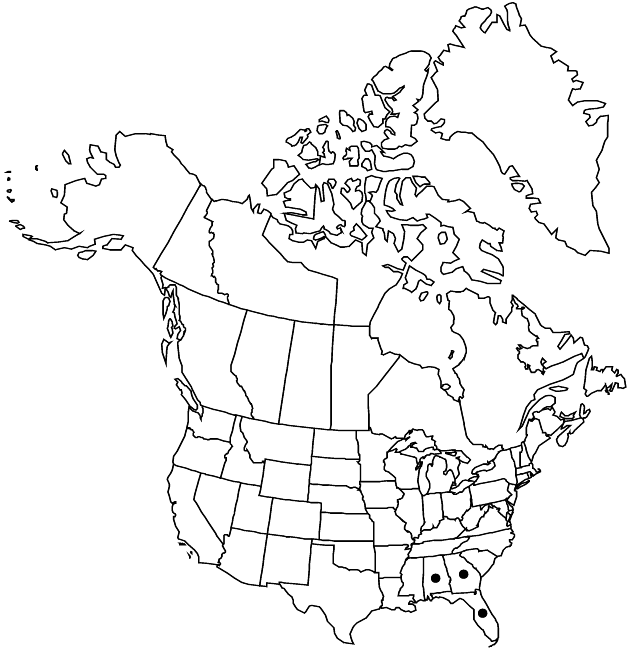Difference between revisions of "Liatris chapmanii"
Fl. N. Amer. 2: 502. 1843.
FNA>Volume Importer |
imported>Volume Importer |
||
| (3 intermediate revisions by 2 users not shown) | |||
| Line 8: | Line 8: | ||
}} | }} | ||
|common_names=Chapman’s gayfeather | |common_names=Chapman’s gayfeather | ||
| + | |special_status={{Treatment/ID/Special_status | ||
| + | |code=E | ||
| + | |label=Endemic | ||
| + | }} | ||
|basionyms= | |basionyms= | ||
|synonyms={{Treatment/ID/Synonym | |synonyms={{Treatment/ID/Synonym | ||
|name=Lacinaria chapmanii | |name=Lacinaria chapmanii | ||
|authority=(Torrey & A. Gray) Kuntze | |authority=(Torrey & A. Gray) Kuntze | ||
| + | |rank=species | ||
}} | }} | ||
|hierarchy=Asteraceae;Asteraceae tribe Eupatorieae;Liatris;Liatris chapmanii | |hierarchy=Asteraceae;Asteraceae tribe Eupatorieae;Liatris;Liatris chapmanii | ||
| Line 35: | Line 40: | ||
-->{{#Taxon: | -->{{#Taxon: | ||
name=Liatris chapmanii | name=Liatris chapmanii | ||
| − | |||
|authority=Torrey & A. Gray | |authority=Torrey & A. Gray | ||
|rank=species | |rank=species | ||
| Line 49: | Line 53: | ||
|publication title=Fl. N. Amer. | |publication title=Fl. N. Amer. | ||
|publication year=1843 | |publication year=1843 | ||
| − | |special status= | + | |special status=Endemic |
| − | |source xml=https:// | + | |source xml=https://bitbucket.org/aafc-mbb/fna-data-curation/src/2e0870ddd59836b60bcf96646a41e87ea5a5943a/coarse_grained_fna_xml/V19-20-21/V21_1335.xml |
|tribe=Asteraceae tribe Eupatorieae | |tribe=Asteraceae tribe Eupatorieae | ||
|genus=Liatris | |genus=Liatris | ||
Latest revision as of 20:09, 5 November 2020
Plants 35–75(–150) cm. Corms globose to elongate. Stems hirtellous. Leaves: basal and proximal cauline 1-nerved, spatulate-oblanceolate to narrowly oblanceolate, 40–150(–180) × 4–8(–11) mm, abruptly reduced (linear, 1–2 mm wide), then gradually reduced distally, essentially glabrous or hirtellous (sometimes mostly along abaxial midveins), gland-dotted. Heads (appressed, overlapping) in dense, spiciform arrays. Peduncles 0. Involucres cylindric, 8–12 × 3.5–5 mm. Phyllaries in 3(–4) series, oblong to oblong-lanceolate, unequal, usually glabrous, rarely minutely puberulent, margins with hyaline borders, apices acute to acuminate. Florets 3–4; corolla tubes glabrous inside. Cypselae (3–)4–6 mm; pappi: lengths ± equaling corollas, bristles barbellate. 2n = 20.
Phenology: Flowering Aug–Oct.
Habitat: Dunes, beach strands, sand ridges, fields, roadsides, longleaf pine savannas, longleaf pine-turkey oak, turkey oak, evergreen oak-sand pine-scrub, scrub with Ceratiola and Pinus clausa
Elevation: 0–50 m
Distribution

Ala., Fla., Ga.
Discussion
Selected References
None.